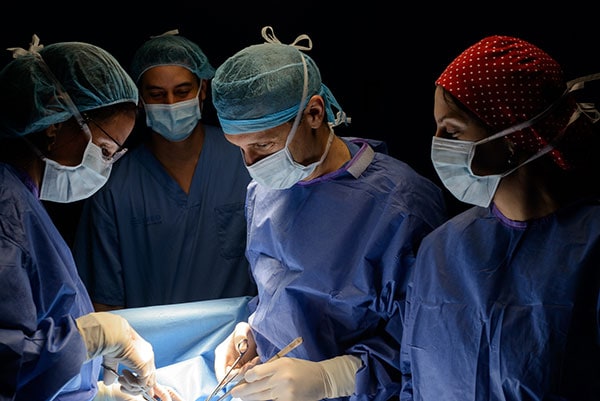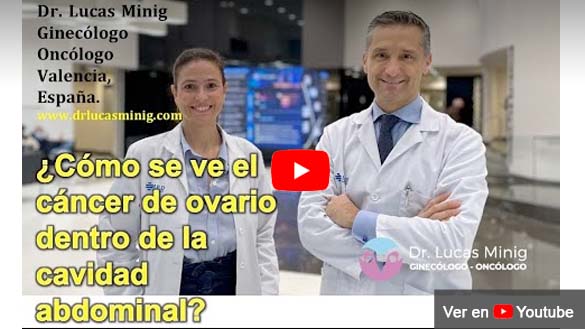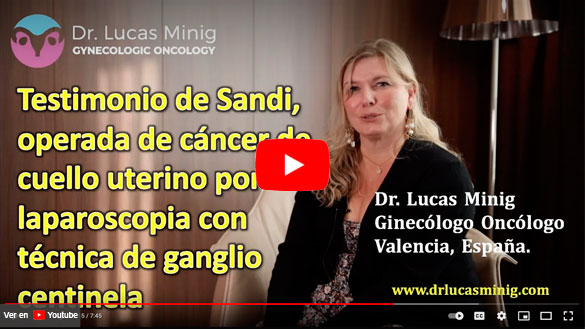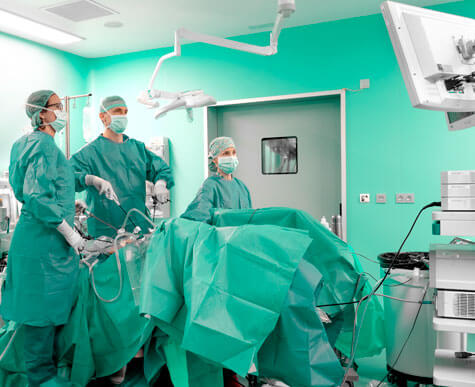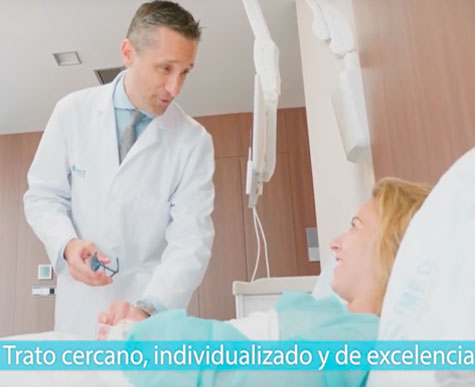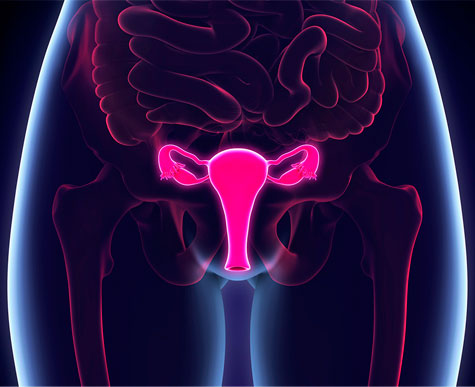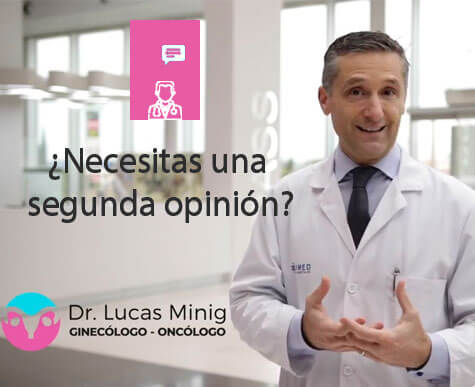Radical Cytoreduction Surgery For Ovarian Cancer with Peritoneal Carcinomatosis
Specialist in surgery for ovarian cancer in Valencia, Spain. Dr. Lucas Minig has face-to-face care in cases that are necessary to make the diagnosis of ovarian cancer and specific treatment for each patient. This type of surgery is performed specifically with a professional Gynecologist Oncologist.
What Does Radical Cytoreduction Surgery for Advanced Ovarian Cancer with Peritoneal Carcinomatosis Consist Of?
The diagnosis of ovarian cancer is made when the disease is already widespread in the abdominal and pelvic cavities in almost 80% of patients. (Stages III and IV of the disease) The picture is also called: “peritoneal carcinomatosis”.
This occurs when malignant cells from the ovary implant themselves in a thin membrane or layer of cells that lines the inside of the abdomen and pelvis and is called the peritoneum.
Cytoreductive Surgery in Spain.
Thus, at the time of diagnosis, the disease is not only found in the ovaries, but also in the form of implants (or nodules) on the peritoneum that covers the intra-abdominal organs such as the intestine, the liver, the spleen, the diaphragm, or the stomach.
Ovarian cancer gives very non-specific symptoms and this makes diagnosis difficult and delays around 3-6 months.
Advanced Ovarian Cancer Treatment
There are currently two treatment strategies for advanced ovarian cancer with peritoneal carcinomatosis. Exhibited below:
Today, Ginecólogos Oncólogos gynecologist oncologist surgeons specializing in ovarian cancer (PDF) recommend complete removal of the disease at the time of surgery after diagnosis (primary cytoreduction surgery or cytoreduction for ovarian cancer).
This is because, all scientific studies show, it is the only modifiable prognostic factor for ovarian cancer patients with peritoneal carcinomatosis.
Therefore, to perform this type of surgery properly, specialized training of the surgical team is required.
To increase the chance of removing all of the diseases at the time of surgery, the procedures have to be performed by properly trained ovarian cancer surgeons – gynecologists.
In addition, it is equally important that they are carried out by multidisciplinary surgical teams where each specialist participates in the different moments of the surgery to guarantee the best therapeutic result.
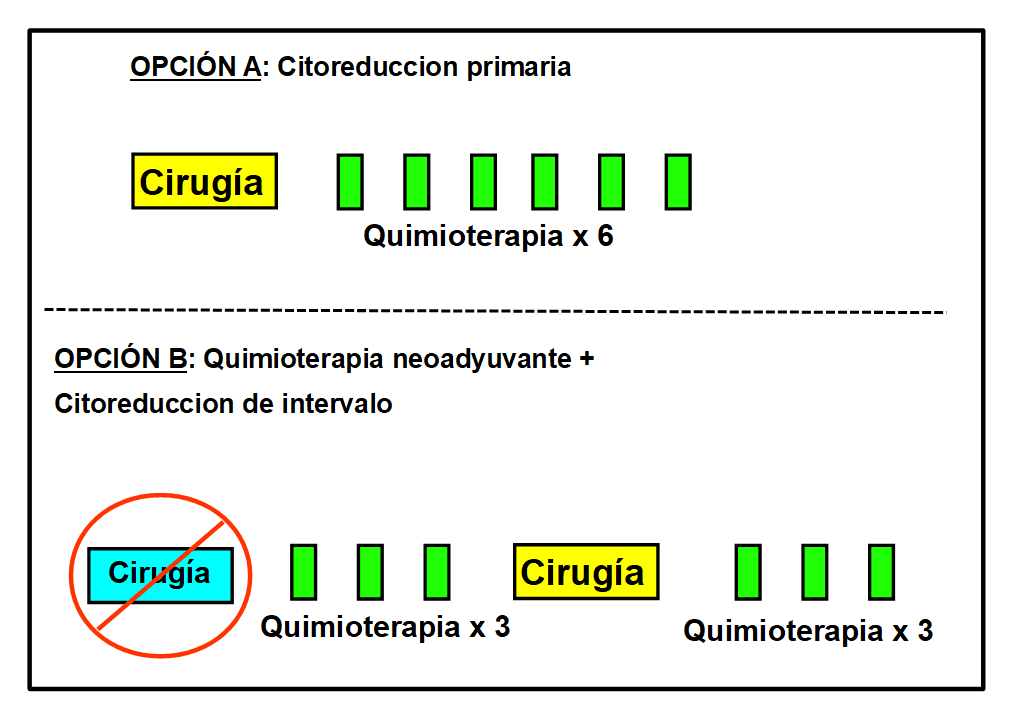
The diagnosis of ovarian cancer is made when the disease is already widespread in the abdominal and pelvic cavities in almost 80% of patients, cytoreduction due to ovarian cancer.
Thus, multiple studies around the world have shown that life expectancies can be extended by up to 30% when surgeries are performed by gynecological oncologists who are specialists in ovarian cancer surgery such as cytoreduction for ovarian cancer, instead of general gynecologists or general surgeons.
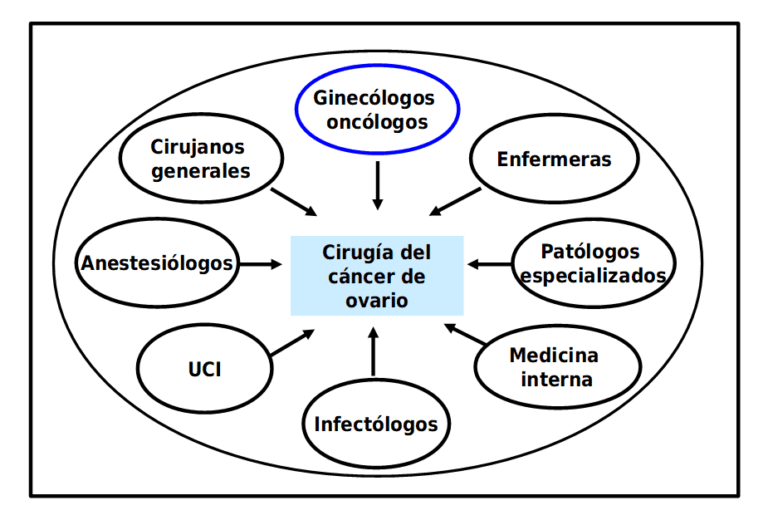
To carry out an adequate surgery that gives the patient the maximum life expectancy, it is necessary to perform multiple surgical procedures in the same operative act and in the same patient.
Hence the importance of working in adequately trained and multidisciplinary surgical teams. They are usually surgeries of approximately 5-7 hours duration where, in addition to removing the uterus and ovaries, it is usually necessary to perform one of the following procedures:
In any case, surgical treatment is always complemented with systemic chemotherapy for 6 cycles (or sessions) separated by 3 weeks each. This is called adjuvant chemotherapy.
What to do when advanced ovarian cancer patients with peritoneal carcinomatosis cannot be operated on?
When to indicate neoadjuvant chemotherapy with interval cytoreduction in women with advanced ovarian cancer with peritoneal carcinomatosis?
The most important point is that each patient with advanced ovarian cancer with peritoneal carcinomatosis is evaluated by surgeons – gynecologists specialized in ovarian cancer.
Thus, based on experience and training, the best initial treatment strategy for each particular patient can be decided.
Not all women with advanced ovarian cancer with peritoneal carcinomatosis can be initially operated on. In certain cases, 20-30% of patients, it is necessary to start treatment with 3 cycles of chemotherapy to reduce the disease (neoadjuvant chemotherapy).
After that, the response is re-evaluated and the possibility of performing a cytoreduction surgery (interval) or also called cytoreduction for ovarian cancer is assessed. Here again, the role of gynecologists specializing in ovarian cancer is key to making the best decision.
The indication of this treatment strategy is based on the following factors:
But in any case, the decision to start treatment with primary cytoreductive surgery or neoadjuvant chemotherapy must be individualized and made by a gynecologist specializing in ovarian cancer together with a multidisciplinary team specialized in advanced ovarian cancer with peritoneal carcinomatosis.
Is Ovarian Cancer with Peritoneal Carcinomatosis hereditary?
Advanced ovarian cancer with peritoneal carcinomatosis is hereditary in 20% of cases. Usually, the main inherited genetic mutations are associated with BRCA 1-2. It is important to mention that women with the mutation in these genes also have an increased risk of breast cancer.
What is the survival of women with advanced ovarian cancer with peritoneal carcinomatosis?
The prognosis of women with advanced ovarian cancer with peritoneal carcinomatosis depends on several factors. The most important factor and the only one that is modifiable is surgery.
This means that all macroscopically visible disease must be removed. While this group of women has the best prognosis, on the contrary, the prognosis worsens significantly when the disease is left after surgery. Hence the vital importance of being operated on by adequately trained gynecological oncologists.
Other factors associated with survival or life expectancy, but not modifiable, including the advanced age and general condition of the patient, the extent of the disease at the time of diagnosis, the histological subtype of the tumor, and the degree of intrinsic aggressiveness that it has.
Thus, while more than 60% of women with advanced-stage ovarian cancer survive for more than 5 years if all of the disease has been removed at the time of surgery, this figure may drop very significantly when unsatisfactory surgery is performed after diagnosis.
Therefore, the lifespan of women with advanced ovarian cancer and peritoneal carcinomatosis will depend on several factors, including cytoreduction which removes the entire disease as a fundamental factor. It is very important to control all aspects related to the disease to guarantee the patient the best standards of care, both in terms of quantity and quality of life.
When is an end-stage peritoneal Carcinomatosis due to ovarian cancer considered?
Certain women with ovarian cancer may experience a recurrence, or return, of the tumor. Although in certain cases it is possible to repeat the cytoreduction surgery, in some cases, the patient with advanced ovarian cancer with peritoneal carcinomatosis enters the terminal phase.
In this case, the tumor can extensively affect the intestine and it is necessary to take all palliative measures to relieve the symptoms of pain and intestinal obstruction.
Our team is made up of specialists in internal medicine and palliative care who provide the best quality of care for this time of illness.
Recommendations after hospital discharge for Ovarian Cancer Surgery
Post-surgical recommendations offered by Doctor Lucas Minig after surgery for ovarian cancer for our patients:
Testimonials from patients with radical cytoreductive surgery.
Doctor Lucas Minig Specialist in radical cytoreduction surgery in Valencia, Spain
Contact the Radical Cytoreduction Surgery Specialist.
Leave us your data and consultation to offer you personalized medical advice
International Consultation
If you want remote medical care, you can consult
through the following links:
International Appointment
Online Consultation
Whatsapp: + 34 679 112 179
Request an appointment with your Trusted Gynecologist in Spain
[yasr_overall_rating]

